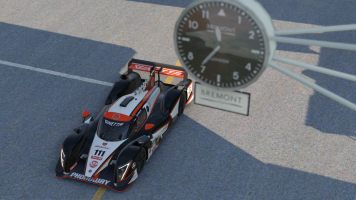Consistency is key in sim racing – especially in endurance races, but sprints also profit from a steady pace without major mistakes. What sounds simple is not necessarily easy to achieve: Trying to make up for lost time can lead to overdriving the car, which in turn results in more time loss. Switching off the lap time delta can help in these cases.
Knowing where you lose time and seeing where you gain it is a great tool to practice different lines and approaches to corners, and having the immediate visualization of this int the shape of the live delta is extremely handy. Unfortunately, as useful as it is for this purpose, it can often be the opposite in racing situations: Repeatedly looking at the live delta can be a big distraction, and, even worse, make you try too hard to regain time, losing even more in the process.
Racers want to go fast, be it on the real track on in a sim rig. As a result, not caring too much about lap times might seem counterintuitive, but that is exactly what helps in races: Focusing on keeping a comfortable pace, especially in longer races, will almost always result in a decent or even good finishing position. Rule number one: Stay out of trouble and you are going to be fine.
From personal experience, racing without the delta (and without a prominently displayed lap time, too) helps consistency immensely. Not everyone will have a problem racing with it on, but if you find yourself struggling to avoid mistakes and a steady pace, switching it off is something you could give a try. Additionally, you could try to focus on how the car's behavior changes as tires wear and fuel is burned off, find a comfortable race pace and be aware of what is happening around your car. That way, you may not always stay out of trouble, but you will certainly increase the probability – which will come in very handy in almost any kind of race.
Knowing where you lose time and seeing where you gain it is a great tool to practice different lines and approaches to corners, and having the immediate visualization of this int the shape of the live delta is extremely handy. Unfortunately, as useful as it is for this purpose, it can often be the opposite in racing situations: Repeatedly looking at the live delta can be a big distraction, and, even worse, make you try too hard to regain time, losing even more in the process.
Racers want to go fast, be it on the real track on in a sim rig. As a result, not caring too much about lap times might seem counterintuitive, but that is exactly what helps in races: Focusing on keeping a comfortable pace, especially in longer races, will almost always result in a decent or even good finishing position. Rule number one: Stay out of trouble and you are going to be fine.
Less Distraction in the Race
If you find yourself looking at the delta multiple times per lap, consider switching it off for the race. You will be updated on your times once a lap when you cross the finish line in most titles or thanks to Crew Chief, so gauging your pace is still possible to make sure you are in a certain window that you and your team are aiming for.From personal experience, racing without the delta (and without a prominently displayed lap time, too) helps consistency immensely. Not everyone will have a problem racing with it on, but if you find yourself struggling to avoid mistakes and a steady pace, switching it off is something you could give a try. Additionally, you could try to focus on how the car's behavior changes as tires wear and fuel is burned off, find a comfortable race pace and be aware of what is happening around your car. That way, you may not always stay out of trouble, but you will certainly increase the probability – which will come in very handy in almost any kind of race.

